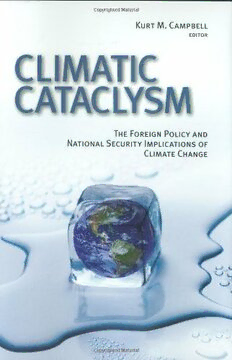
Climatic Cataclysm: The Foreign Policy and National Security Implications of Climate Change PDF
253 Pages·2008·1.529 MB·English
Most books are stored in the elastic cloud where traffic is expensive. For this reason, we have a limit on daily download.
Preview Climatic Cataclysm: The Foreign Policy and National Security Implications of Climate Change
Description:
Climate change threatens not only the environment but global peace and security as well. Climatic Cataclysm brings together experts on climate science, foreign policy, political science, oceanography, history, and national security to take measure of these risks. The contributors examine three scenarios as a basis for future planning. The first scenario projects the likely effects of the expected level of climate change over the next thirty years, based on current scientific models. The severe scenario, based on a much stronger response to current levels of carbon loading, foresees profound and potentially destabilizing global effects over the next generation or more. Finally, the catastrophic scenario is characterized by a devastating "tipping point" in the climate system, perhaps fifty or one hundred years hence. In this future world, the land-based polar ice sheets have disappeared, global sea levels have risen dramatically, and the existing natural order has been destroyed beyond repair. Climatic Cataclysm analyzes the security implications of these scenarios, ranging from disease proliferation, large-scale migration, and increased low-intensity conflict to the risk of nuclear war. It also considers the lessons that can be learned from previous civilizations confronted with natural disaster and asks what the three largest emitters of greenhouse gases—the United States, the European Union, and China—can do to reduce and manage future risks. Climate change may prove to be the single greatest challenge confronting the United States and indeed, human civilization. Climatic Cataclysm helps explain why. Contributors: Sharon Burke (Center for a New American Security), Leon Fuerth (George Washington University), Jay Gulledge (Pew Center on Global Climate Change), Alexander T. J. Lennon (Center for Strategic and International Studies), J.R. McNeill (Georgetown University), Peter Ogden (Center for American Progress), John Podesta (Center for American Progress), Julianne Smith (Center for Strategic and International Studies), Richard Weitz (Hudson Institute), and R. James Woolsey (Vantage Point Venture Partners).
See more
The list of books you might like
Most books are stored in the elastic cloud where traffic is expensive. For this reason, we have a limit on daily download.
